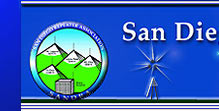What is HAM RADIO?
What is a REPEATER?
What is APRS?
What is a NET?
Why do I have to be licensed?
How do I get licensed?
How much does
it cost?
Where do I take the test?
Do I have to be licensed to join
SANDRA?
I'm licensed, live in another state, but frequently spend time in
the San Diego area. May I join SANDRA?
How do I join?
How does SANDRA support public safety?
I want to support your organization with a donation--how do I send
a donation?
What is HAM RADIO?
The Amateur Radio Service (a.k.a. "ham radio")
is defined in Part 97 of the Rules of the Federal Communications Commission
as
an assembly of Federally licensed radio operators who may voluntarily
serve as an alternate means of communication in times of disaster.
In non-emergency situations, licensed amateur radio operators can
use their equipment to perform experiments, hone skills, or simply
chat with other hams from all over the world. So, it's a hobby with
a purpose.
Some people have no idea what ham radio is. It is not "CB;" it
is not commercial broadcast (no news or music). Those who are familiar
with ham radio usually picture a house full of electronics, antennas
to the sky, and some operator "rag chewing" with some distant
("DX") station. While that is part of the story, ham radio
also offers many other modes of operation, Morse code, satellite,
television, and even data (i.e., using a modem with radio instead
of a phone line).
What is a REPEATER?
A repeater is a term for a device often used in amateur radio
as well as commercial and emergency radio communications. It consists
of typically
a transmitter and receiver, a controller (the "brains",
which sees if someone's talking and fires up the repeater access,
plus often more) and a duplexer so you can use one antenna for simultaneous
transmit and receive operations. A repeater receives signals and rebroadcasts them on a different frequency.
A repeater is used for increasing the distance that stations can communicate.
Say you want to chat with a friend on another side of a hill. Your
radio transmissions can't make it to the other side of the hill and
vice-versa. So what to do? Why not put a repeater on top of the hill?
Both of you can now talk to each other, and often many other hams
still further away (depending on the height of the hill upon which
the repeater sits).
[return to top]
What is APRS?
APRS: Automatic Position Report System. To learn more about this, please
see our APRS
Primer for available links.
What is a NET?
When a "Net" officially begins, the Net Control
Operator will give a "preamble" which describes the net
and how it functions. As you listen to the Net progress, you'll hear
stations
all over San Diego as well as other parts of Southern California check-in.
Sometimes you'll hear them say they're "mobile." Some of
them are out camping. Some of them are just at home in their shack.
Listen for very long, and you'll start to feel like you've got some
old friends all over Southern California.
Why do I have to be licensed?
The Federal Communications Commission (FCC) requires anyone operating
on the amateur radio frequencies to be properly licensed.
[return to top]
How do I get licensed?
See our page on general licensing information and visit: http://www.arrl.org/hamradio.html
How much does it cost?
Testing is $5.00 to defray expenses. For more details, see the Testing
Locations page.
Where do I take the test?
Please visit our list of Testing
Locations. There is also a downloadable list available on that
page.
Do I have to be licensed to join SANDRA?
Technically, no. The San Diego Repeater Association is open to anyone.
However, an Amateur Radio License issued by the Federal Communications
Commission is required prior to accessing any of the SANDRA radio
systems. Membership alone does not grant access to the radio equipment.
I'm licensed, live in another state, but frequently spend time in
the San Diego area. May I join SANDRA?
Yes. Please see our Join page.
[return to top]
How do I join?
Membership applications are processed online and through the mail.
You may either submit your information through an online form or
download a printable form through our Join page.
Please view our Operating
Procedures and Terms
of Service before
submitting your application.
How does SANDRA support public safety?
For details, please visit this page: Public
Safety.
I want to support your organization with a donation--how do I send
a donation?
SANDRA accepts donations through the US mail and PayPal. If you wish
to make a donation, please see our Support
Us page.
[return to top]
[home]





